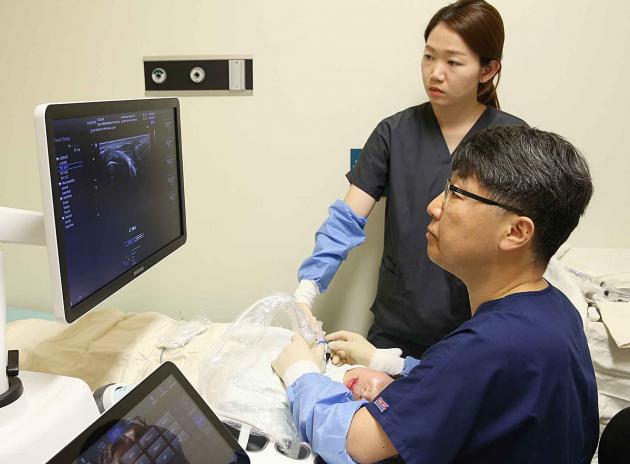A research team at Asan Medical Center has confirmed, through an extended follow-up study, that patients who received radiofrequency ablation (RFA) treatment for relapsed thyroid cancer remain healthy for long without recurrence or side effects.

The team, led by Professor Baek Jung-hwan, analyzed 29 patients who underwent RFA therapy for relapsed thyroid cancer from September 2008 to April 2012. The patients’ tumor size shrank by an average of 99.5 percent, and 42 of the 46 observed tumors disappeared entirely.
“The test results show that RFA therapy may be a good alternative for people with relapsed thyroid cancer, who cannot receive surgery due to health problems or old age,” the team said. “Although RFA therapy was known to be effective in relapsed thyroid cancer, this is the first study to prove that the treatment is effective even after five years.”
The team also confirmed the safety of the treatment as all patients who participated in the study, including an 84-year-old, were healthy without long-term complications. RFA is a procedure in which doctors use frictional heat to kill the tumor cells. The treatment generates friction heat of about 100 degrees Celsius after inserting the using ultrasound to remove the tumor cells.
The study showed that 90 percent of all tumors were completely removed with a single RFA treatment. As the treatment is non-invasive, the patient can have a faster recovery and less risk of complications.
Some side effects, such as voice changes and pain, may occur immediately after the procedure. Still, the study confirmed that patients who had initially experienced side effects saw their symptoms gradually improve to go back to normal, and no patients experienced long-term side effects.
In detail, three of the patients showed a temporary change in voice after treatment, but recovered within two months, while two patients who had had pain in the tumor area during the RFA therapy also saw their symptoms disappear during long-term observation.
“The study proves that RFA therapy is effective for a long time in relapsed thyroid cancer,” Professor Baek said. “Therefore, RFA therapy may be a good alternative for patients who are old or not in need of surgery.”
If the tumor size is too small or there are a lot of tumors, however, surgical removal may be safer than RFA therapy, so patients must consult with an experienced clinical practitioner to determine the appropriate treatment, Baek added.
European Radiology published the result of the research.

